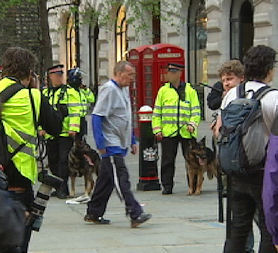Ian Tomlinson coroner asks for judge at inquest
The coroner involved in investigating the death of Ian Tomlinson at the G20 demonstrations has requested to be excused from presiding over the forthcoming inquest, Channel 4 News learns.

Paul Matthews is expected to announce today at a pre-inquest review, the response from the Ministry of Justice to his request to appoint a judge to take charge of the case.
Channel 4 News understands Mr Matthews’ decision follows a request from Mr Tomlinson’s family for someone more expert in criminal matters to take charge, in the wake of the Director of Public Prosecutions’ (DPP) decision not to put on trial the police officer who seen on film hitting the 47-year-old news vendor with a baton shortly before he collapsed and died.
The pathologist brought in by the coroner to carry out the first post mortem, Dr ‘Freddie’ Patel, was blamed for the DPP’s decision not charge PC Simon Harwood.
The General Medical Council last week suspended Dr Patel from carrying out postmortem examinations in suspicious death cases and suspended him for three months after being found guilty of misconduct, and bringing the profession into disrepute, in three other cases dating back to 2002.
However Mr Matthews is not thought to have referred to the Patel case when listing the reasons why a “retired or serving judge” should preside over the inquest in his place.
During the G20 protests in central London last April, Ian Tomlinson died shortly after he was filmed being hit by a police officer.
Video footage filmed by an eyewitness and by a Channel 4 News cameraman showed a member of the Metropolitan Police’s territorial support unit striking out at Mr Tomlinson with a baton, and then pushing him to the ground.
Mr Tomlinson, 47, staggered about 100 metres from the scene and was found several minutes later collapsed on the ground.
The Director of Public Prosecution (DPP) announced earlier this year that the police officer involved would face no charges – after considering the three charges of manslaughter, assault and misconduct.
Mr Tomlinson’s family spoke of their bitter disappointment at the “disgraceful” decision not to charge the PC involved.
Three post-mortem examinations were conducted on Mr Tomlinson’s body arrived at differing conclusions.
The first pathologist, Dr Freddie Patel, found he died of natural causes, linked to coronary artery disease.
The second pathologist, Dr Nat Carey, found he died of internal bleeding as a result of blunt force trauma, in combination with cirrhosis of the liver. A third, conducted on behalf of the officer, agreed with the findings of the second post-mortem.
Keir Starmer, DPP, said earlier this year that prosecutors did not believe they could prove a “casual link” between the alleged assault on Mr Tomlinson and his death, blaming a “sharp disagreement” between the medical experts that was “irreconcilable”.
Mr Starmer said prosecutors also considered assault charges but could not prove the strike or push substantially harmed Mr Tomlinson.